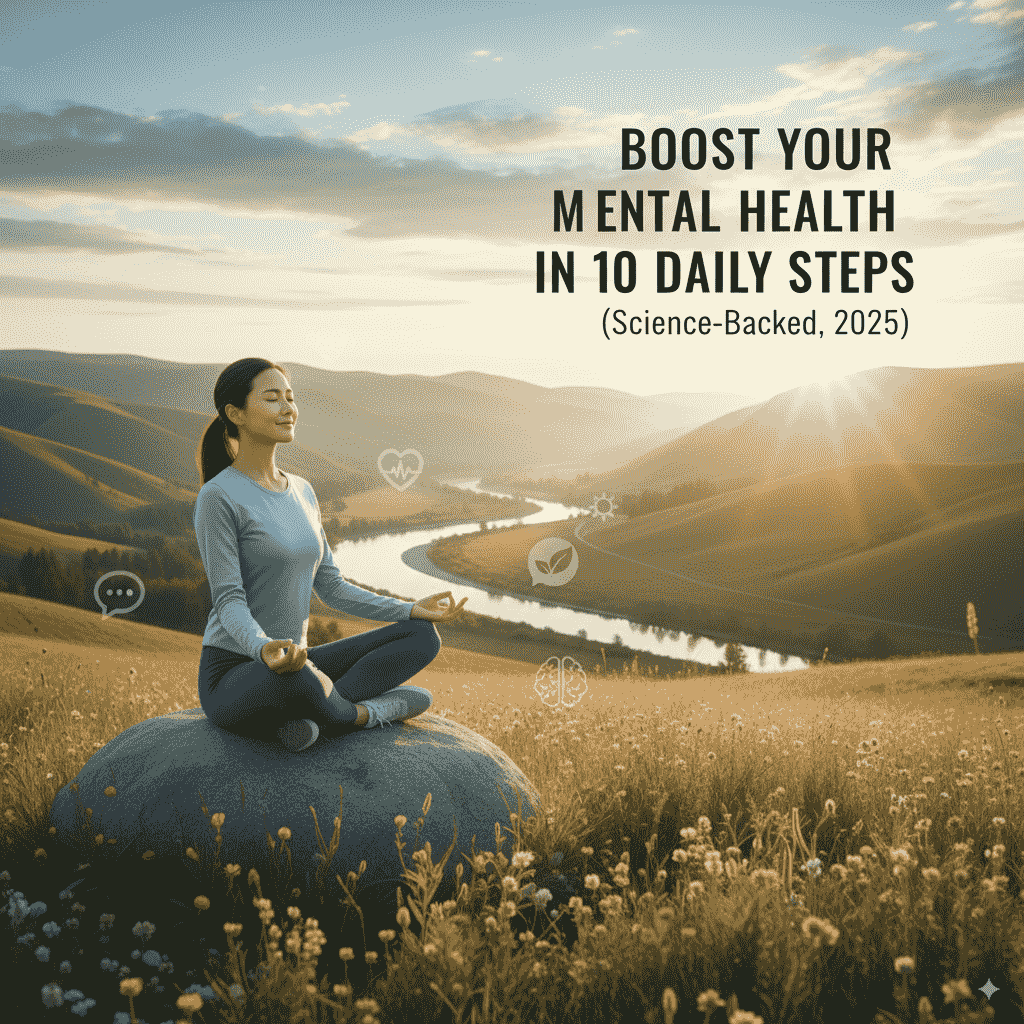
In today’s fast-paced world, mental health has become as important as physical health. With constant stress, digital overload, and lifestyle imbalances, people are looking for simple yet effective ways to stay mentally strong. This 2025 guide shares 10 daily habits that improve mental health—practical, science-backed, and easy to adopt worldwide.
Why Daily Habits Matter
Daily routines are the backbone of mental well-being. Unlike temporary fixes, small daily habits for mental health create consistency, build resilience, and give long-term benefits. Studies in 2025 confirmed that individuals who maintained simple routines such as walking, social interaction, or mindful reflection reported significantly better emotional stability. The message is clear: habits don’t need to be extraordinary, but they do need to be regular.
1. Move Your Body Every Day
Physical activity is one of the most reliable tools for improving mental health naturally. Exercise boosts endorphins, sharpens focus, and lowers stress. Even a brisk 20-minute walk can refresh the mind and reduce anxiety. The key is not intensity but consistency—doing something daily that makes your body feel alive.
2. Prioritize Restful Sleep
Sleep is often underrated, yet it is the foundation of both mental and physical wellness. Poor sleep disrupts mood, concentration, and stress management. On the other hand, keeping a steady bedtime and practicing good sleep hygiene—like reducing screen use before bed—can dramatically improve emotional balance. In 2025, experts emphasize sleep as a non-negotiable habit for emotional resilience.
3. Practice Mindfulness and Breathing
Mindfulness and breathing exercises help manage racing thoughts and reduce emotional turbulence. Just 10 minutes of deep breathing or meditation daily can calm the nervous system and improve emotional clarity. Apps, guided sessions, or simple breathing techniques are enough to bring mindfulness into everyday life.

4. Stay Socially Connected
Human connection remains a core pillar of emotional well-being. Simple conversations, sharing a laugh, or meeting a friend can lift your mood. Research in 2025 revealed that people who spoke to others daily reported much higher mental wellness compared to those who stayed isolated. Even short, meaningful interactions count more than endless scrolling on social media.
5. Spend Time in Nature
Being outdoors helps the brain reset and recharge. Exposure to green environments lowers stress, improves focus, and increases positivity. If possible, a walk in the park or sitting in your garden can work wonders. For those living in cities, even short “green breaks” or indoor plants can create a soothing effect.
6. Express Gratitude Through Journaling
Writing down thoughts or small daily reflections can shift your perspective. A gratitude journal encourages focusing on what went right rather than what went wrong. This habit trains the mind to notice positivity, which slowly builds optimism and reduces negativity.
7. Limit Screen Time
Excessive screen use, especially on social media, is directly linked to anxiety and overthinking. Setting digital boundaries frees mental space for healthier activities. Whether it’s keeping phones away before bedtime or scheduling offline time daily, a digital detox protects mental clarity.
8. Engage in Creative or Cognitive Activities
Keeping the brain engaged prevents it from dwelling on stress. Reading, learning, puzzles, music, or painting not only distract from negativity but also promote growth. These activities bring joy, help achieve “flow states,” and support long-term emotional well-being.
9. Acts of Kindness and Helping Others
Helping others releases dopamine and creates a sense of meaning. Simple gestures like offering help, giving compliments, or volunteering can transform your day. Research consistently shows that kindness boosts self-worth and reduces stress hormones.

10. Set Healthy Boundaries
Mental health often suffers when people take on more than they can handle. Learning to say “no” is essential for protecting energy and preventing burnout. Healthy boundaries allow you to give your best without draining yourself. This habit makes space for personal growth and balance.
Quick Summary of Core Benefits
Here are the major takeaways from these daily habits:
- Boost mood and reduce stress naturally
- Strengthen focus and memory
- Improve sleep quality and emotional balance
- Build resilience against anxiety and depression
- Create long-term stability in mental health
Building a Habit That Lasts
The secret is not adopting all habits at once but starting with two or three and building gradually. Using habit-stacking—connecting a new habit to an existing one—makes it easier. For example, after brushing your teeth, take two minutes to note down gratitude points. Over time, these small practices create a strong mental health routine. How long will it take to notice improvements in mental health?

Conclusion
Mental health in 2025 is not about grand resolutions but about everyday actions. By focusing on daily habits for mental health, you can create a lifestyle that supports calmness, focus, and happiness. Whether you choose to move, meditate, journal, or connect with others, what matters is showing up consistently.
These habits are not quick fixes—they are investments in your long-term emotional well-being. Start small today, and let the power of daily practice shape a healthier, happier you.
How long will it take to notice improvements in mental health?
Some benefits, like better mood or reduced stress, can appear within a few days. Meaningful long-term change usually occurs within 3–8 weeks of consistent practice.
Are these habits effective worldwide?
Yes, these habits—exercise, mindfulness, social connection, gratitude, and boundaries—are based on universal human psychology and physiology. Studies have tested them across different countries and cultures.
Can mental health apps replace these daily habits?
No. Apps can support these habits by offering reminders, meditation guides, or journaling prompts, but habits build long-term resilience that apps alone cannot replace.
What if I miss a day or can’t follow the habit?
Missing a day is normal. The key is to resume without guilt. Focus on the habit streak as a long-term practice, not a single-day perfection.


